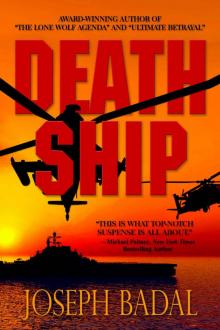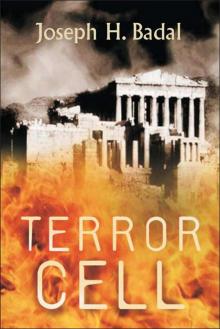- Home
- Joseph Badal
Ultimate Betrayal Page 2
Ultimate Betrayal Read online
Page 2
“Yeah, that’s true, Carmelita. But I heard Tommy didn’t want to go out that day. David kept pestering him. Their parents wouldn’t let David go out alone; he was too young. So, Tommy finally agreed to go.”
“You think he’s going into the Army because of what happened to his brother?”
Gino’s mouth dropped. “You’re too damned smart for your age.” He smiled. “Get outta here so I can do some work.”
Carmela nodded, stood up, and walked to the office door. She tried to wipe away the tears from her eyes before Papa noticed. She didn’t know what to do about the ache in her heart.
DECEMBER 12, 2002
CHAPTER 3
Lieutenant James Ross crawled up the side of a natural trench in the Nad-e Ali District of Helmand Province, Afghanistan and peeked toward the sun, which now rested on the horizon. He blew into his gloved hands and tried to warm his fingers. “Damned cold!” he muttered. He turned to his right and looked at Sergeant David Hood. “There’s supposed to be a Taliban unit out there somewhere, but I haven’t seen or heard a thing.”
“With these mountains, a thousand snipers could be fifty yards from us and we wouldn’t know it, Lieutenant,” David said.
Ross peeked over the top of the trench once again. “Sergeant, have the men check their ammunition and supplies. I’m going to call for a resupply drop.”
“Already done, sir. We’re down to three magazines per man and a day’s worth of water and MREs.”
“How’re Peterson’s feet?”
“Not good. He’s got blisters on blisters.”
“I’d better call for a medevac. Between the cold and the terrain, I’m surprised all of us aren’t crippled. Damned coun—”
David saw the lieutenant’s skull explode, felt warm, wet spray hit his face, heard the distinctive sound of an AK-47 rifle. Then the whump, whump, whump of launched mortars. The bullets and mortars seemed to come straight from the setting sun.
“Sonofabitch! Sonofabitch!” David panicked, felt the urge to run. But there was no place to run. He forced himself to stay under control. “Incoming!” he shouted into his headset. “Incoming!” He looked left and then right. The eighteen men in his unit were arrayed in a depression, which meandered off to the left on a relatively straight line and on the right curved in an arc that ultimately turned west into the now half-set sun. He grabbed Lieutenant Ross’s boots and pulled his body down into the trench.
On the radio communications net, David ordered the men on his right to only fire at clearly visible targets. “Conserve ammo,” he told them.
The first mortars impacted twenty-five yards short of and to the left of his position, damned close to his men in the left side of the trench. He ordered those men to move past him to join up with the right side of the unit, where the trench was at its deepest. This left David alone, a good thirty yards from his closest team member. He unslung his grenade launcher and “walked in” rounds in twenty-yard increments, beginning about fifty yards in front of his position. At about the one hundred-yard mark, he heard shouts and screams.
“Bad guys at about one hundred yards in front of my position,” he said to his men, as he popped off another half-dozen grenade rounds. Then he ran to join the rest of the team. He radioed headquarters, gave his team’s position, and called for air support.
Another round of mortars rained down on where David had been a minute ago. Ross’s body was probably obliterated. When the mortars stopped, all David heard was his own breathing. A minute passed. Then another. And another. Five minutes in all. Then a phalanx of armed men rose from crevices in the side of the mountain and moved toward the Americans. Like pop-up targets in an arcade shooting gallery, the tribesmen appeared, then disappeared, appeared, then disappeared again, shooting all the while. They moved toward both ends of the trench.
David had been in fire fights before and had learned how the enemy operated, what sort of tactics they used. He had to prevent the Taliban force from executing a pincer maneuver. His throat constricted as the reality of the situation hit home. With the enemy so close to them, it was too late for the Americans to retreat en masse to high ground, especially with some sunlight still present. They’d be easy targets. They were out-numbered, pinned down in a depression, and low on ammunition. And the enemy controlled the high ground. The only hope they had was to pull back in small groups while the rest of the platoon provided cover fire. If they could reach high ground and hold off the Taliban until air support arrived, they might make it.
David ordered Sergeant Pritchard and three other men to find cover in the boulders above and behind them. Stooped over, Pritchard and his three men ran toward the boulders while David and the rest of the unit fired at any Taliban fighter who showed himself. The four men serpentined around rock formations and then raced up a goat path toward the elevated position, when a heavy automatic weapon suddenly opened up. David recognized the drumbeat of an NSV Utyos 108 mm machinegun, probably captured years ago by the mujaheddin from the Soviets. He looked back at Pritchard’s team and saw one of the men lying on the goat path. Pritchard and two of the men had made it to the shelter of the boulders.
“Pritchard, what’s your status?” David said over his headset.
“Johnson was cut to pieces. Fuckin’ heavy machinegun.”
“You all okay?”
“Yeah. Nothing serious.”
“Stay low,” David told Pritchard. “I’ll touch base in a second.”
When the sun dropped completely below the horizon, mortar rounds again fell from the sky.
“Check with air support,” David told his radioman.
“FAC, this is Blue Team Six, where’s that air support?” the radioman shouted into his radio.
“Thirty minutes out,” the Forward Air Controller shouted back.
Thirty minutes! David thought. We’ll be dead in thirty minutes.
Based on previous experience, David suspected what the Taliban leader might do. He’d drop mortar rounds on the trench for five or ten minutes until he’d done as much damage as possible and then he’d have the heavy machinegun rake the trench from one side, while the rest of his men attacked the survivors in the trench from the other side.
David flipped down his night vision device and scanned the hillside in front of him. He caught brief glimpses of enemy fighters and huge greenish blooms that came off the mortar rounds as they exited their firing tubes. Mortar rounds impacted just in front of their position. The Taliban had zeroed in on them. They didn’t need sunlight anymore. They knew exactly where David and his men were. The next rounds would wipe out his team.
To make matters worse, the heavy machinegun opened up again. The machine gunner fired a ferocious one-minute burst and then went inactive. Probably to reload, David thought. The hot lead from the weapon had bloomed on David’s goggles.
“We’ve got to get out of here now,” David told his men. “Fall back to that rock formation at the bottom of the goat path. Take weapons, ammo, and night vision goggles only.”
David counted fourteen men leave the trench. He followed them to a large rock outcropping and slipped behind it.
The machinegun opened up two minutes later while mortar rounds destroyed the trench the Americans had just vacated. Then the machinegun went quiet and the Taliban stopped firing their rifles. They’ll attack now, David thought. And once they found the trench unoccupied, they’d figure out the Americans had retreated up the back side of the hill.
“Fall back to Pritchard’s position,” David ordered.
His men left the rock outcropping and ran up the goat path toward high ground. David looked back at them and watched as they scaled the path. Without his night vision glasses, they would have been invisible. Then he looked back toward the trench.
David smelled the Taliban fighters before he heard or saw them. A mixture of goat, sweat, and tobacco. Then, through his goggles, he sa
w two men move noiselessly toward the right end of the trench and veer toward his position. They passed the edge of the rock formation he hid behind. David stepped out, covered the second man’s mouth with his hand, and thrust his combat knife into the man’s kidney. He slowly lowered the man to the ground and moved to follow the first man. He was three paces away, when the Taliban fighter turned and raised his rifle. David used his knife to deflect the muzzle of the rifle. But the weapon discharged and David felt a shock of hot pain hit his right thigh. His leg crumpled beneath him. He shifted his weight to his left leg, pointed his knife hand at the man, and launched himself forward. His knife penetrated the man’s chest and was nearly wrenched from his hand as the blade hit a rib.
The Taliban fighter dropped his weapon and grabbed David’s wrist with both of his hands. David hopped forward and continued to press the knife against the man’s chest. It took almost half-a-minute before he felt the man’s grip weaken. Then the Taliban fighter sagged to the ground and went still.
David figured the jets were still about fifteen minutes out. He retreated behind the rock outcropping again. A minute passed and then he heard whispers. A group of half-a-dozen or so men passed him, stopped, and clustered around the two bodies of their comrades. He moved from the rocks and fired his assault rifle into the group until his magazine was empty. Then he again took cover, ejected the empty magazine, and inserted his last fresh one.
Voices echoed off the mountainside and mixed with the groans and cries of the men he’d just fired on.
Then he heard in his ear bud, “Sergeant Hood, where the hell are you?”
David ignored the voice and took a step forward when automatic weapons fire drove him back behind the rocks. Rounds struck and ricocheted off the rock wall behind him and propelled metal and rock shrapnel at and around him. Then something hot hit him in the back, knocked him to the ground, and drove the air from his lungs. He felt blood dribble down his back. Sharp shards of rock slashed his face and torso. Blood poured from a cut on his forehead and blinded him. He felt light-headed. Each breath he took felt as though someone twisted a knife in his lungs. On hands and knees, he sucked in minute quantities of air until his head cleared. He jerked the scarf from around his neck, wiped away blood from his eyes, and tied it around his head. He rose, stood on one leg, and lobbed two grenades in the direction of the trench. Then from above and behind him, his team rained a hailstorm of bullets down on the Taliban positions. The enemy fighters stopped shooting.
David took this opportunity to hobble up the goat path. He stumbled over the Taliban bodies that littered the trail. After a few seconds, the enemy fighters down by the trench opened up on him again. He dropped to the ground. Bullets slapped the rock wall behind him and kicked up dirt and rock from the path. His team again fired at the enemy. David tried to right himself, but his wounded leg wouldn’t support him and his good leg cramped. Then his men stopped firing. They had to be out of ammunition. He looked down and saw tribesmen move in his direction. He rolled onto his back, aimed his rifle, and fired a burst. The first three men fell while the men behind them retreated.
Suddenly, a tribesman came out of nowhere, screamed “Allah akbar!” and charged. David shot him with his last bullet. He tried once again to stand; he didn’t want to die on his back. But it was no good. He took his 9 mm pistol from his holster and vowed to kill at least one more of the enemy before they killed him. He had a brief thought about his brother before one of the Taliban fighters stepped onto the path and moved toward him.
David shot the man as he shouted, “Die, asshole!” He expected more of the enemy to appear when the sweet throaty sounds of jet engines roared overhead. Barely conscious, David saw two F/A-18 fighter jets scream past as they dropped incendiary bombs on top of the depression where David and his team had been a few minutes earlier. The planes circled around and fired their M61 Vulcan cannons into the side of the mountain. David could see Vulcan rounds impact the hillside twenty yards from where he lay.
David awoke at a field hospital. A man with Major’s insignia on his white coat stood next to his bed. The man held a two-inch metal fragment.
“Nice to see you finally awake.” He handed David the piece of metal. “That came out of your back. Thought you’d like a souvenir.”
David couldn’t have cared less about the metal shard the doctor had taken from him, but he said, “Thanks.”
The doctor patted his shoulder.
“How are my men?”
“Two dead, including the lieutenant, and one wounded. The others all got back. Thanks to you.”
“I didn’t do a thing,” David said.
The doctor shook his head. “I hear that shit all the time. Despite the fact you don’t think you did anything, that firefight will probably get you a Silver Star, besides the two Purple Hearts for your wounds. And I hear you’ve been promoted to Master Sergeant. Not bad for being in the Army less than two years.”
“When can I rejoin my unit?”
The doctor laughed. “That won’t happen any time soon. It will be a couple months before your wounds heal and you’re able to rehab your leg. You’ll have a limp for a long time, if not forever.” The man picked up a brown envelope off the bottom of David’s bed and handed it to him. “Those are your new orders.”
After the doctor left him, David opened the envelope and read the orders. He had been assigned to something called the Special Logistical Support Detachment at Headquarters, United States Forces-Afghanistan. His heart sank. They’ve assigned me to some bullshit desk job, he thought.
DECEMBER 22, 2002
CHAPTER 4
David reported in at Bagram Air Force Base for his new assignment. He cooled his heels for an hour in the air conditioned splendor of a camouflaged building the size of a Wal-Mart store before Marine Gunnery Sergeant Fred Laniewski came and led him out into one of the myriad corridors that crisscrossed the enclosure.
“Inside this place, you’d never know you were in the middle of a war zone,” Laniewski said as he moved aside to avoid two Army generals.
David chuckled. “Sure isn’t what I’m used to.”
“I heard,” Laniewski said. “You miss the boonies.”
“Yeah, like a sharp stick in the eye.”
“This place is the little sister of the Pentagon,” Laniewski said. “We call it the Afghan Puzzle Palace. You can’t walk around here without running into dozens of high-ranking officers. They all have one purpose in life—build up the enemy body count for the Pentagon so they can politic their way to a promotion.”
David looked askance at Laniewski. “You’re joking, right?” The grim, determined look on the Marine’s face told David otherwise.
“So, what kind of unit is this? Grunts and Jarheads together?”
“Navy and Air Force, too,” Laniewski said. “You’ll see.”
Laniewski led David through the halls and stopped at a metal-clad door in what appeared to be a vault planted in the middle of the building. The Marine picked up a telephone receiver from the wall and identified himself.
An Army lieutenant opened the door and frowned. “It’s about time, Fred,” he said, as he backed into the room.
David followed Laniewski through the doorway.
“The Colonel’s having a conniption fit about the records you owe him,” the lieutenant continued. “He owes CENTCOM a report.” The lieutenant stared at David, as though he’d noticed him for the first time. “Is this the new meat?”
“Yes, sir. Sergeant David Hood, meet Lieutenant Eric Carbajal.”
“Good to have you here,” Carbajal said. Then he turned back to Laniewski. “Show Hood his desk, then take that information to Colonel Bishop.”
Laniewski pointed at a gray metal desk in the second of three rows of identical ones. They were crammed into a forty-foot by forty-foot room. Most of the desks were occupied. “You’ve been assigned to the Special
Logistical Support Detachment, a newly formed, top-secret unit,” Laniewski said. “Our mission is code-named “Operation Harvest.” The unit’s commander is Army Colonel Rolf Bishop.” Laniewski scowled and in a whisper said, “You sure as hell don’t want to get on Bishop’s bad side. He’s the worst sonofabitch I’ve ever met. The guy’s got steely-gray eyes that scare grown men and would give little children nightmares.”
David thought Laniewski had exaggerated. Bishop would have to be a psychopath to be a worse sonofabitch than the men he’d fought against for the past few months . . . or men who worked for Gino Bartolucci back in South Philadelphia, for that matter.
“The War in Afghanistan is only in its second year,” Laniewski said, “and it’s already obvious the U.S. will smash the Taliban and their Al Qaeda buddies. The only questions are how long will we hang around, what kind of Afghan government and military will we leave behind, and how long will it take the Taliban to recover and replace the Afghan elected government? Some congressmen have already warned about Afghanistan becoming another Vietnam. There are threats in Congress to drastically cut funds targeted for Afghanistan, which is what happened in the early seventies in Vietnam.”
“It’s a bit early in this war to compare Afghanistan to Vietnam,” David said. “In 1971, we’d already been in Vietnam for, what, eight or nine years.”
“How do you know that? That’s ancient history.”
David shrugged. “I read a lot.” After a beat, he asked, “So, what do we do here?”
“We bring weapons, ammunition, and all sorts of other equipment and materiel into Afghanistan that won’t be needed here for years to come. The serial numbers of hundreds of critical items not even scheduled for production are inputted to Afghan government property books. As quickly as these goods are manufactured, they’re shipped over here. The Pentagon’s goal is to enable the Afghan military to continue to wage war against the Taliban, even after U.S. forces and U.S. financial support are eventually withdrawn.

 Death Ship
Death Ship Evil Deeds (Bob Danforth 1)
Evil Deeds (Bob Danforth 1) Terror Cell (Danforth Saga Book 2)
Terror Cell (Danforth Saga Book 2) Borderline
Borderline Shell Game
Shell Game The Pythagorean Solution
The Pythagorean Solution Dark Angel (Lassiter/Martinez Case Files #2)
Dark Angel (Lassiter/Martinez Case Files #2) Ultimate Betrayal
Ultimate Betrayal